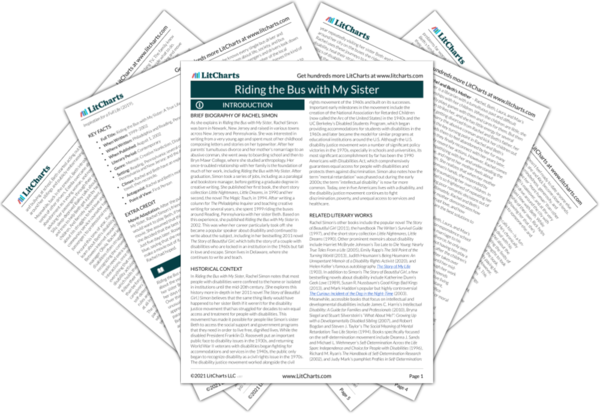Olivia Quotes in Riding the Bus with My Sister
I hang up in a swirl of relief and shame. I have lived with mental retardation for thirty-nine years, and I have never asked anyone what it really is. In the interest of raising four equal children, our parents almost never uttered the words except in private and never added books about mental retardation to our shelves. In fact, I’d read about this disability only in works of fiction […] and none of them answered the questions that I hadn’t thought to ask. But why should it have occurred to me to do so? Mental retardation had just always been my sister, and my sister had always been it.
Wouldn’t it be nice, even liberating, if I could begin to see beyond my cynicism and resistance and controlling impulses? […] I think about how so many of these drivers, at crucial turning points, learned to view and inhabit their own lives in fresh ways, [and] slowly it comes to me.
Beth is living by her own choices, unfettered by the whims of an institution or group home placement decision; she travels according to the starred dots on her map; she eats what she likes when she’s hungry; she boldly dresses in a fireworks display of ensembles that declare, Look at me, I count in this world. She is, in many ways, the embodiment of self-determination.
A tension that I hadn’t even realized I’d been feeling—a tension that has possessed my body throughout this day—for weeks, no, for months—begins to ease.

Olivia Quotes in Riding the Bus with My Sister
I hang up in a swirl of relief and shame. I have lived with mental retardation for thirty-nine years, and I have never asked anyone what it really is. In the interest of raising four equal children, our parents almost never uttered the words except in private and never added books about mental retardation to our shelves. In fact, I’d read about this disability only in works of fiction […] and none of them answered the questions that I hadn’t thought to ask. But why should it have occurred to me to do so? Mental retardation had just always been my sister, and my sister had always been it.
Wouldn’t it be nice, even liberating, if I could begin to see beyond my cynicism and resistance and controlling impulses? […] I think about how so many of these drivers, at crucial turning points, learned to view and inhabit their own lives in fresh ways, [and] slowly it comes to me.
Beth is living by her own choices, unfettered by the whims of an institution or group home placement decision; she travels according to the starred dots on her map; she eats what she likes when she’s hungry; she boldly dresses in a fireworks display of ensembles that declare, Look at me, I count in this world. She is, in many ways, the embodiment of self-determination.
A tension that I hadn’t even realized I’d been feeling—a tension that has possessed my body throughout this day—for weeks, no, for months—begins to ease.











